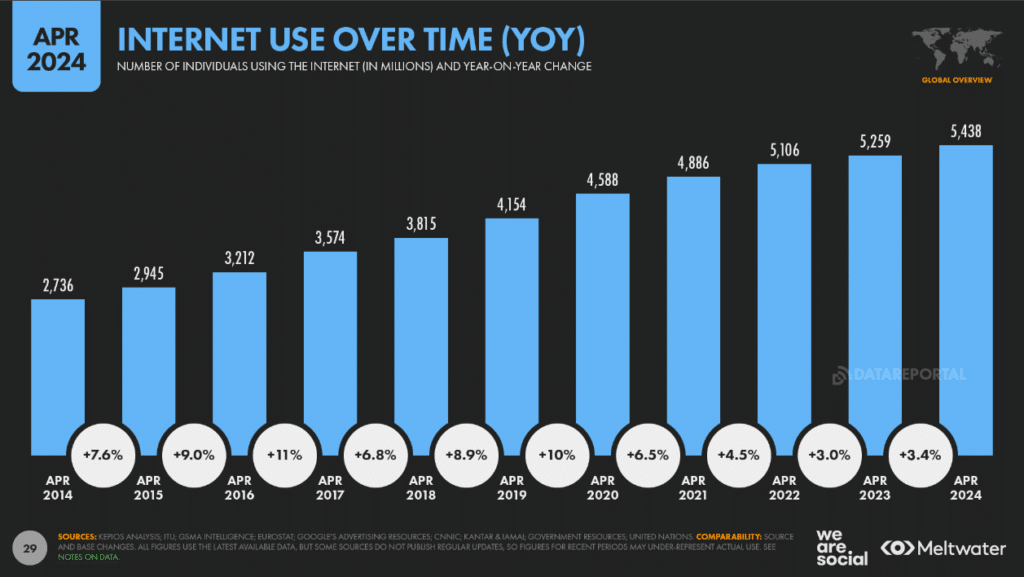DIGITAL MARKETING ?
It’s the group of activities that a company or individual performs online. These activities attract new business opportunities, create relationships, and develop a brand identity.
The concept of Digital Marketing illustrates its extensive range and flexibility. The multitude of tools, data, and channels accessible online enables marketers to provide impactful content tailored to specific individuals through personalization.
Are you in search of a targeted advertising method for a distinct audience that can facilitate your brand's expansion? Employing Digital Marketing strategies, such as email marketing or ads within niche social media groups, can draw in a specialized audience by conveying messages that align with their particular interests.
On the other hand, if your aim is to reach a larger market and enhance brand recognition, leveraging video ads and traditional advertisements on social media and search engines can showcase your brand to millions. Regardless of your target audience or the niche nature of your product, there are effective ways to engage them
The Importance of Digital Marketing
It may appear astonishing, but the number of internet users around the globe is still on the rise. Recent data reveals that in 2024, there are approximately 5.4 billion internet users, which constitutes 66% of the world's population.
This upward trend is expected to persist as more individuals gain internet access. The implications of these statistics, along with the internet's profound influence on shopping habits, highlight the necessity of digital marketing in today's landscape. To succeed, marketers must connect with their target audiences in the spaces they frequent and at the right moments.
With consumers increasingly engaging on social media, utilizing search engines, and spending time online, digital marketing has become an indispensable element of any effective marketing strategy. Neglecting this aspect could mean missing out on valuable business opportunities.

Why Your Company Needs Digital Marketing
There is a valid reason why digital marketing is considered a revolutionary development in the industry. It creates a distinct platform for businesses to harness a limitless array of information, leads, and potential customers.
Failing to engage in digital marketing means forfeiting one of the most rewarding marketing opportunities present today. At its core, the internet is the essential driving force behind this trend.
With billions of users online every day, digital marketing delivers exceptional reach and engagement that traditional methods are unable to provide.
The current digital marketing landscape
The digital landscape enables brands to connect with their current and potential customers regardless of geographical boundaries. Engaging with your audience does not require physical proximity; the online environment facilitates these interactions seamlessly.
Advancements in technology have evolved basic mobile phones, initially intended for voice communication, into sophisticated computing devices. Users now have the capability to connect with others through various platforms, all accessible from their handheld devices. Smartphones have gained immense popularity, particularly among Millennials and Generation Z. Social media applications such as Instagram, Facebook, and TikTok consume a significant portion of their time, providing companies with a direct avenue to engage with these demographics.
Facebook, one of the leading social media platforms, boasts over 2 billion active users, making it a favored choice for businesses aiming to promote their products. Other platforms like Instagram, LinkedIn, and TikTok can also serve as effective marketing tools, depending on your specific objectives and target audience. Given the extensive reach of these platforms, advertising for businesses can often feel like an effortless endeavor.
Benefits of Digital Marketing
Digital marketing stands out as one of the most effective marketing strategies available to businesses today. To illustrate this, we will outline several advantages of implementing digital marketing.
1. The most measurable form of marketing
The foremost advantage of Digital Marketing is arguably its capacity for tracking and measurement. To ensure the effectiveness of any marketing strategy, continuous monitoring is crucial. The digital environment, driven by data and algorithms, simplifies the evaluation of a strategy's success.
Unlike traditional marketing channels, which often complicate measurement efforts, Digital Marketing provides a straightforward approach to performance assessment.
By leveraging Digital Marketing analytics, businesses can eliminate the guesswork that often accompanies traditional marketing. These tools enable real-time insights into audience engagement, including the number of views, interactions, and shares of your content.
2. The most cost-effective marketing technique
Besides providing the capability to monitor all your posts along with their likes, comments, and shares, digital marketing is also regarded as the most budget-friendly marketing approach.
It is important to highlight that digital marketing is relatively less costly compared to many traditional marketing techniques. Historically, there was a clear distinction in advertising access between larger corporations and smaller businesses, but that has changed. Today, smaller companies can engage with audiences that they might not have reached before.
Competing for ad space in traditional marketing can be extremely challenging for smaller enterprises, yet digital marketing allows them to effectively connect with their desired audience with ease.
3. Allows you to choose any audience
. In terms of audience selection, Digital Marketing presents a remarkable advantage in its ability to cater to both specific and broad demographics. You can identify and engage with niche communities on social media platforms like Instagram or Reddit, effectively targeting a specialized audience. Alternatively, broader outreach is achievable through internet advertisements or sponsored posts on Facebook and Instagram.
No matter your target demographic, Digital Marketing ensures you can connect with them. Furthermore, leveraging influencer marketing allows you to penetrate specific markets through trusted individuals, who often require sponsorship support. Users are inclined to follow the links provided by these influencers, and partnering with a reputable figure within your desired community can significantly enhance trust in your brand.
4. Everyone is already there
One of the significant issues people encounter with traditional marketing is the uncertainty of visibility: "Will anyone see it?" Securing a location in the busiest parts of a city often comes with a hefty price tag.
Digital Marketing alleviates this concern entirely. With billions of users accessing the internet and social media platforms daily, the focus shifts from whether the content will be seen to when it will be viewed. Traditional advertising, including print media, has inherent limitations on audience reach.
No matter how extensive the network, traditional marketing strategies have a finite capacity for engagement. Conversely, Digital Marketing approaches provide unlimited exposure opportunities and can evolve alongside the business.
5. Customers start their buying journey on the internet
Customers now depend heavily on the internet for their purchasing decisions and options. For a growing number of individuals, the buying process initiates with research and insights into the desired product or service. The internet is the most effective venue for obtaining this information.
The phrase "Google it" has become a staple in our vernacular, indicating that most people instinctively search online for information. A 2019 study by Orbelo revealed that 85% of consumers consult the internet prior to making a purchase.
This emphasizes the importance of establishing a strong Digital Marketing strategy to position your brand as the solution that these consumers are actively seeking.
6. The message can be customized
Digital Marketing offers a significant advantage in its ability to customize messages for specific audiences. Unlike the traditional advertising landscape, where generic messages were broadcasted through mass media channels like billboards, television, and flyers, the current environment allows for a more targeted approach.
Historically, this broad messaging often led to ineffective engagement, as it attempted to reach a diverse audience with varying interests and demographics. Today, marketers can focus on particular groups based on shared traits, enabling them to create messages that are more relevant and engaging.
Approaches such as email marketing, online advertising, and niche marketing can all be tailored to effectively connect with the desired audience.
The Difference Between Direct and Digital Marketing
Direct marketing and digital marketing are two distinct forms of targeted advertising, each with its unique characteristics. Direct marketing is rooted in traditional offline practices, utilizing physical materials such as mailers, brochures, and coupons to advertise a business, product, or service.
This method can be beneficial for representatives who need to provide customers with physical items during their interactions. Conversely, digital marketing aims to connect with audiences through online channels, employing strategies like social media, search engine optimization, and content marketing to achieve its goals.
Online Marketing vs. Digital Marketing
While many individuals often confuse "online marketing" with "digital marketing," it is important to recognize that they are distinct concepts. Nevertheless, they are interrelated, and it is essential for marketers and brand representatives in the digital era to understand both. Digital marketing encompasses any marketing content that utilizes electronic devices. In contrast, online marketing is a specific subset that pertains to marketing content disseminated exclusively via the internet.
To clarify, all online marketing falls under the broader category of digital marketing, which includes strategies such as content marketing, SEO, and email marketing. However, digital marketing also encompasses other avenues, including digital billboards, radio and television advertisements, and SMS marketing.
Inbound Marketing vs. Digital Marketing
It is crucial to differentiate between "digital marketing" and "inbound marketing," even though they are sometimes mistakenly used as synonyms. Digital marketing is a broad term that encompasses any marketing strategies that leverage digital channels, platforms, or communication methods. Inbound marketing, on the other hand, is a specific form of digital marketing that stands in contrast to outbound marketing.
Outbound marketing typically involves traditional tactics aimed at reaching a large audience without regard for their prior interest in the product, such as trade shows, cold calls, and generic online ads. In contrast, inbound marketing employs targeted strategies to connect with potential customers who have demonstrated interest in the product or are experiencing relevant challenges.
The content produced through inbound marketing is crafted to provide value, whether through education, entertainment, or assistance, with popular formats including specialized blogs, ebooks, videos, social media updates, and online seminars.


Comments
Post a Comment